

Grand River's Telephone System |
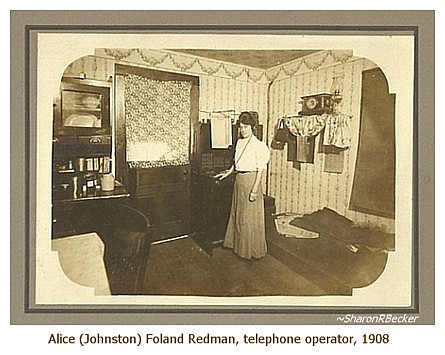 |
GRAND RIVER’S HAND-CRANKED HEARTby Denise CARINGER, Tribune Staff WriterDes Moines Tribune Des Moines, Polk County, Iowa July 18, 1975 |
GRAND RIVER, IA. – In a little frame house just off the main street
lies what some folks think of as the "heart" of Grand River.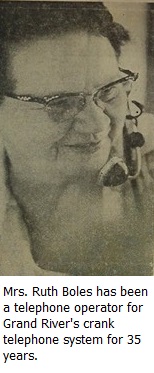 The
"heart" is a busy, buzzing, ringing board dotted with numbered holes,
from which a "life line" goes out to each of the 250 users of this
old-fashioned crank telephone system. And at the center of the systems,
of course, is the friendly telephone operator, who not only places
incoming and outgoing telephone calls, but has become a sort of general
information service here. The
"heart" is a busy, buzzing, ringing board dotted with numbered holes,
from which a "life line" goes out to each of the 250 users of this
old-fashioned crank telephone system. And at the center of the systems,
of course, is the friendly telephone operator, who not only places
incoming and outgoing telephone calls, but has become a sort of general
information service here.Later this month, Grand River will become Iowa's last community with a crank telephone system after New Market switches to dial telephones. The old wooden crank telephones have long since been replaced by desk-type telephones with cranks. But other features of the old system remain. To call a number, residents "ring up" the local operator who places the call. To call Grand River from another town, a person cannot dial direct, but must go through an operator. The old-time system may sound quaint, but folks in this farm-oriented community are quick to point out that retaining the crank system is more than a clinging to the past. "It works," says Russell VANDERFLUGHT, lineman and manager for the Rand River Mutual Telephone Co., "and it costs each customer just $30 a year. Why Change?" VANDERFLUGHT said that in a survey last year here, residents opted 3 to 1 to keep the crank system. He likes to tell about the time the ice storm knocked out all telephone lines around. "We had our system back in shape in four or five days," he said proudly. "It took the dial systems two weeks."  VANDERFLUGHT
himself handles repairs and maintenance of the system. The switchboard
is about 31 years old, but the connecting board – a myriad of lines and
fuses – dates back to 1902, he said. VANDERFLUGHT
himself handles repairs and maintenance of the system. The switchboard
is about 31 years old, but the connecting board – a myriad of lines and
fuses – dates back to 1902, he said.One of the central figures in the system for 35 years has been telephone operator Mrs. Ruth BOLES, who now works the night shift. When Mrs. BOLES plugs in her line to answer a call, she’s ready to handle anything from a medical emergency or a fire to inquiries about when the garbage truck will come around. Mrs. BOLES, like Grand River's four other operators, calls customers by their first names and will call around town to locate d party who doesn’t answer his or her own telephone at home. "You get to know where people hang out," she said. Mrs. BOLES says that being a telephone operator here has meant getting involved in the lives of those she serves. "It's interesting, but it's been sad, too," she said. Mrs. BOLES recalled making calls "out east" to a naval base during World War II to check on a "local boy who had become quite ill. When we found out he had died, we had to take the message to his folks," she said. "That's the sort of thing we have to do." 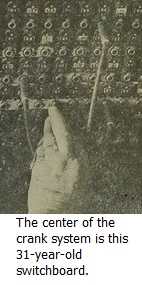 Calling
to the east coast in the 1940's meant going through operators in a dozen
or more cities, she said. Calling
to the east coast in the 1940's meant going through operators in a dozen
or more cities, she said."Each operator would put you through to the operator in the next closest city, all the way across the country." She said. "Today it's much easier. To call long-distance, I call the Mount Ayr operator, who then dials the call direct for us. We're connected to all the modern telephone facilities. We're not isolated here." Although each customer here is on a party line with three other customers, Mrs. BOLES pointed out that even many dial systems in the state still have party lines. "I think people here still prefer our personal service," she said. "If the fire whistle blows, everybody calls in to find out where the fire is, and we can tell them." VANDERFLUGHT said there are "no plans at all" to change over to dial telephones. He said replacement parts still are available and repairs are no problem. "Eventually, I suppose, they'll have to switch over, but I can't see it coming yet," he said. "The only way we'll change is if the majority of people here say they want the dial telephone." "And that's not likely." |
| Ruth (SPRAY) BOLES wrote the following article in
1978: This is the year 1978 and our telephone is over 100 years old. It was invented by Alexander Graham BELL. He first talked over it on March 10, 1876. He called his helper Mr. WATSON, saying, "Mr. WATSON, come here – I want you." On February 6, 1882, Western Electric won competition to manufacture phones for Bell. On June 17, 1914, a transcontinental telephone line was completed, and service began in 1915 between New York and San Francisco. It took 23 minutes to get a call through. It has been growing by leaps and bounds ever since, Bell Telephone being a leading company. The first line from Leon to Grand River was built around 1900. As the men were working to put the line up, southeast of Grand River, there were some neighborhood boys hanging around watching. One of the men asked what they were doing. One said, "We are trying to see that wire. It must be howl if you can talk through it." The old brick building on the north end of main street, on the west side, was built in 1898 and 1899. The first telephone office was set up in the upstairs of the building. The board was operated by Addie COMBS. She was later married to Bert STREET. Later the office was moved to the upstairs of a frame building located south of where the bank is now. Nellie LINKEY and her mother lived there and ran the board. Later Mrs. Harry WELDON managed it for a while. Then Mr. and Mrs. Bird DAY. We think it was while they were managers that the Company purchased the house where the office is located at present. It was built by John HEWLETT and sold to the Telephone Company when it was finished. The switchboard and the block was set up in one room and the remainder of the house was used as a residence for the manager and his family. At first, the telephone dues were only $2.50 per year. In 1936, they were raised to $3. At this time we had a line No. 111 that went northeast of town. Sammy PALMER had a telephone on this line with a side switch. From town you could call them and they could ring a party on the Van Wert or DeKalb line and connect it so they could talk. We also had free lines to Van Wert, Beaconsfield, Hopeville, and Decatur. We could call free through Beaconsfield, then Kellerton on to Mt. Ayr or Ellston. Through Decatur to Leon with no charge. The first book records we have on the Company were the year January 1927 to 1928 when Arthur BLAIR was treasurer of the Company. For a while before this Mr. and Mrs. Jim HOPKINS were managers, and in the year 1928 they retired and Mr. and Mrs. Fred CREES were hired as managers. At this time we had 76 town phones and 17 farm lines, a total of 204 telephones. The most on any one line was 23 phones. The dues at this time were $3 per year, no Federal and no State tax. Each line was owned by the subscribers. They had their own officers and the ones on the line did their own line work. The treasurer of the line collected the dues from each subscriber and they were then turned in to the main office. In 1928, Elba SHEWMAKER was elected treasurer of the Company and served several years until about 1944 or '45. In 1930 Orval BURCHETT was elected secretary of the Company and started keeping the books in 1931. He continued as secretary until his decease. Mrs. Fred CREES became very ill in 1930 and Fred hired Mr. and Mrs. Lowell HARGER to work for him. Mrs. CRESS was deceased in 1931. After this Fred resigned. Mr. and Mrs. Jim HOPKINS were hired again. Phyllis (WARRICK) STARK worked for them and helped operated the switchboard. After eight years, in 1938, they resigned and Mr. and Mrs. Clark BURCHETT were hired. This year the dues were raised to $4 per year. The Company was having some trouble with the overhead cable that ran from the west end of town to the east end. In 1939 and 1940, they decided to take it down, recoat it, and bury it underground. They did this while Clark BURCHETT was manager. They hired Earl GRIMM to help with the work. Also used local help in laying the cable. And in 1941, the dues were raised to $5 per year to help cover expense. My parents, Mr. and Mrs. Marion SPRAY, were hired as managers in 1918. I learned at that time to operate the switchboard and worked all that year. Then Mr. and Mrs. Bert KELLEY were managers and later, Mr. and Mrs. Frank HAWK. I also worked some for them. In 1940 to 1942, Mr. and Mrs. Clarence BRYANT were managers. In 1942 to 1943, Mr. and Mrs. Willie BRYANT. Royal and I were hired as managers Sept. 1, 1943, and we worked until March 1, 1976. In 1945, the Company purchased the new Stromberg-Carlson switchboard which we are still using. It was supposed to be delivered to us on June 12, 1945. The contract was signed by George BRYANT, president of the board, and Elba SHEWMAKER, treasurer. George BRYANT continued in that office until his death in 1963. Frank BRAMMER was also a member of the board. The new switchboard was not delivered until in September and since Royal was on a hunting trip in the West, our son, Darrold BOLES, assisted a gentleman from Mount Ayr to install it on Sunday. It was ready for use on Monday morning. Our family, Royal and I, Eunice, Donna and Darrold, all learned to operate the switchboard and took turns at it. During the years we were working, Royal rebuilt all the town lines and rewired the block in the office two times, making charts of color codes for all the wires coming in through can-tops and the block. He did all the line work on the switchboard until the Company re-organized about 1964. At that time they hired a line-man, Russell VANDERFLUGHT. When we took over the management, we had 18 farm lines and 114 town telephones. We were having some trouble with electric noise on our farm lines, so started to make them metallic, using two wires for each line. Also had trouble with the old underground cable because of moisture. So bought and put up new cable from the west end of town to the east end. Royal hired Gene SEVIER of Creston to help him do the work. Then, with Russell helping Royal, they put up cable all over town. The last few years, the Company has purchased used cable and installed it in the country, reducing the number of telephones on each line to four. Russell was lineman for a while, then Walter MILLER for two years. Russell was hired again and is still working, probably in all about 14 years. In the years we lived in the office, we were able to improve the house and property quite a bit. In 1958, I wrote up a telephone directory and had it printed. We have had one every year since. Five years ago, I rewrote it making all the listings 7 digit numbers. I did this because the long distance operators were having trouble putting our numbers on their I.B.M. Cards. In 1943, when we took over the managership, we had one long distance line and Beaconsfield used it also. The long distance business has grown every year since, with the Bell Company adding a new line every few years until at present we have six long distance circuits out of Grand River to Mt. Ayr. At times they are all so busy that we have to wait for a free circuit. We call Mt. Ayr our toll center, give them our calls and they dial direct for us, giving us direct dial prices on our calls. Since 1943, I did all the book work in the office until January, 1976, when the Company employed a bookkeeper, Donna MORELL. I retired on March 1, 1976, and now am working just part-time. We moved out of the office into our own home. The Company employed Helen CAMDEN as night operator. We have three other operators working part-time in the day time. Betty ADKISSON, Minerva LOGAN, and Virginia THOMAS. I still wok just part-time. Some of the operators we had working over the past years were Mrs. Dean THOMAS (Virginia), 5 years; Mrs. Ernest ADKISSON (Betty), approximately 16 years; Mrs. Bernard CAMDEN (Helen), 7 years; and several others for shorter periods of time. The members of the Board for the past several years have been Sherman BAKER, Noel STARK, Max BINNING. The board members at the present time are Noel STARK, Bernard CAMDEN, and Robert TAYLOR. Chris MORELL is secretary-treasurer, Mrs. Chris MORELL (Donna), the bookkeeper; and Russell VANDERFLUGHT is manager and lineman. All together I have worked for the Company more than 35 years. They have been pleasant years, as everyone has been so wonderful to us and we appreciated everyone’s thoughtfulness and kindness. MO - RUTH (SPRAY) BOLES, 1978 |
| Des Moines Tribune Des Moines, Polk County, Iowa circa 1978, date clipped off NO-DIAL PHONE CLUB DOWN to TWO FRUHLING’S IOWA, by Larry FRUHLING GRAND RIVER, IA. – There is a kind of a last man's club that involves the Grand River Mutual Telephone Co. and the Bryant Pond, Maine, Telephone Co. A few years ago there were 10 members of the club, but time and "progress" have thinned the ranks of the tiny phone companies in which nobody can dial anybody else, and all calls have to be placed by an operator – a real live human being who not only connects those calling and those being called, but also serves as the town's help, information center, and bearer of good and bad news. The dial telephone has invaded such hamlets as Timewell, Ill., Circleville, W. VA., and McClure, Ohio, since 1975, and now only Bryant Pond, a village in western Maine, and Grand River, a small town in southern Iowa, are left. There is a lot of sentiment now in Grand River for selling the customer-owned telephone company to another firm in Princeton, MO., that would convert the system here to dial. That would mean the seven women operators would lose their jobs and machinery would take over. Instead of turning a crank on their phone set to reach the operator, who in turn connects the caller with the number being called, Grand River phone company patrons simply would dial the number, the same as people do in Chicago, Des Moines, New York and Dubuque. It would also mean that the Bryant Pond Telephone Co. in Maine would be the sole survivor of the system of making phone calls that every community in the country once used. This would please Elden HATHAWAY, who owns the Bryant Pond Company and is fairly determined to hang on to his operator-run system. "I'd hesitate to go in debt $100,000 or $200,000 or whatever it takes to change the thing over," HATHAWAY said. "I think one of these outfits should be preserved for posterity as long as possible." With their February bills, patrons of the Grand River company will get ballots asking whether the firm, in which each paid-up customer holds a share of stock, should be sold and thereafter converted to dial. Ruth BOLES, whose parents managed the company in 1918, and who, with her husband, Royal, ran the concern from Sept. 1, 1943, until March 1, 1976, has a lot of sentimental reasons for wanting the system to remain the same. But she said she is going to vote for the sale and conversion to dial. BOLES, 75, who still fills in as an operator every Saturday and one Sunday each month, thinks it might be fun to try to outlast Bryant Pond as the last non-dial phone system in the country, but she is also a realist. "It's going to have to be done sooner or later," she said. "We'd just as well be starting on it." Although the telephone system in Grand River works well and costs little (just $4 a month for basic service on a party line), there are some problems beyond the control of the little company. One of them, said BOLES, is that operators in other towns, especially those new to the job, have difficulty making calls to Grand River. "They have the awfulest time," she said. The operator in Chicago, for example, is apt to be utterly perplexed when someone tries to make a call to "number one," the BOLES' number in Grand River. In addition, the Grand River company – as well as other mom and pop telephone companies in Iowa – are under increasing pressure from the Iowa Commerce Commission to reduce the number of customers on party lines to no more than four. BOLES said the Grand River company, which once has as many as 23 customers trying to use one line, has done a good job of cutting the party line patrons to a maximum of four to a line. "We had it all down to four except for one line once, but then people move into vacant houses in the country and you have to put them someplace," she said. BOLES said last spring Grand River's 244 customers voted on a proposal to get rid of the operator-run system, and it narrowly failed. She predicts a "nip and tuck" outcome in the balloting in February. Her husband, Royal, 76, describes himself as a "conservative." He said that if Russell VANDERFLUGHT, the manager of the company and its lineman, can continue to keep up Grand River’s cables and equipment, he might vote against the sale and conversion. "I may just cancel her vote," Royal said, winking at Ruth. The dial (or the push-button) telephone is a fine machine for making calls quickly and with a minimum of confusion. But even your most technocratic engineer would have to concede that the telephone operators at Grand River do things machines can't. A dial telephone would not have known that Dorothy was at Bessie's, or that Mary was at her mother-in-law's, or that, as Virginia THOMAS could best remember, the stores at Leon are open until 8 on Friday nights. And that's not the half of it. A short time back, when BOLES was on weekend duty, a farm boy in the area was hurt when a tractor tipped over. The boy's parents were not at home and no one knew how to reach them. Nobody except BOLES, that is. The neighbors knew that the boy's father was hauling livestock for another farmer, but they didn't know to where. BOLES found out who the boy's father was working for, called the livestock owner, found out where the stock had been taken, got ahold of the sale barn, and finally was able to tell the boy's father about the accident. There are other things, too, that the Grand River operators do for the company's patrons: When school is called off by bad weather, they ring up everyone on a party line or two and pass the word. They use the same system for announcing church suppers and rummage sales, and for helping to find strayed dogs. When someone dies, the neighbors call "central" to chip in for flowers. Sometimes they send the flower money in with their phone bills. The operators blow the town whistle at 7 a.m., when it’s time to get up, at noon when it’s time for lunch, and at 6 p.m. when it's time to knock off work for the day. They also blow the siren when there's a fire, and call every member of the Grand River's volunteer fire department. They track down doctors and nurses for the ill, find ambulances to transport the seriously stricken, and, occasionally, help a wife track down her husband at his favorite haunts. They order fuel for a woman in town who has a disability that makes it difficult for her to talk. But the operators understand what she says, and they pass the message on to the delivery man. When Grand River Mutual Telephone Co. patrons go on vacation, they customarily leave numbers where they can be reached in an emergency with the operator in the white frame house that serves as the phone company headquarters. The list goes on. The Grand River Mutual Telephone Co. was started about 1900 when the line was extended from Leon, some 15 miles distant. Although the equipment has been upgraded from time to time, the system operates now as it did in the beginning. John DEEMER, a hog buyer for Armour who does a lot of his business on the telephone, thinks it's time for a change. William Van Duin RITCHIE – who runs a grocery store and other enterprises in this Decatur County community of 211, by last official count – is against it. RITCHIE, 73, thinks the cost to convert would push up monthly bills and that putting the seven operators out of work would hurt the town's economy. "That's the only payroll in town that amounts to anything," he said, attributing the agitation for change to "some of 'em who are just never satisfied - they just want to be up to date." DEEMER, 32, said he'd like to have private lines on which to make offers for hogs, and adds that sometimes long-distance calls never make it to Grand River because of the confusion of operators on the originating end. "You get some young gals that's just starting and they don't know from sic 'em," DEEMER asserted. |
| Des Moines Tribune Des Moines, Polk County, Iowa February 19, 1979 GRAND RIVER SAYS 'YES' to MODERN AGE, DIAL PHONES by Larry FRUHLING, Tribune staff writer 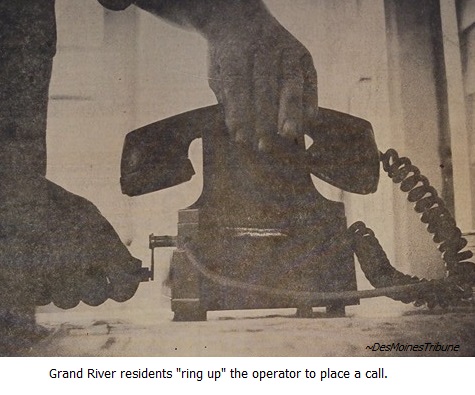 GRAND
RIVER, IA. – Ruth BOLES, 75, was having a busy Saturday at the
switchboard, plugging in and then unplugging short cords to connect
callers and people being called. That was normal. Saturdays, BOLES said,
usually are busy for some reason. GRAND
RIVER, IA. – Ruth BOLES, 75, was having a busy Saturday at the
switchboard, plugging in and then unplugging short cords to connect
callers and people being called. That was normal. Saturdays, BOLES said,
usually are busy for some reason.But in the next room, the days of the Grand River Telephone Co., with which BOLES and her family have been involved since 1918, were being numbered. Noel STARK, a 68-year-old Grand River farmer, was reading ballots and grunting, "Yes, yes, no. . .no, yes, yes, no, yes, no, yes. . . ." and it soon became clear that the yeses were winning, meaning that the Grand River Telephone Co., one of the only two non-dial phone companies left in America, was going to go modern. "The story's told," STARK said when the 194 ballots were all tabulated. A total of 121 patrons of the tiny telephone company had voted "yes" to the question: "Do you wish to go dial?" There were 73 "no" votes. 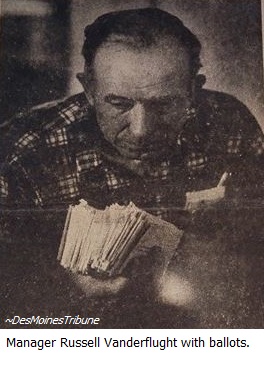 The
plan now is for a larger telephone company at Princeton, Mo., to come in
and install a new system, complete with up-to-date dial telephones. The
plan now is for a larger telephone company at Princeton, Mo., to come in
and install a new system, complete with up-to-date dial telephones.When the new system is completed, probably in about two years, the Grand River Telephone Co., which has done business since 1900, will simply go out of existence, leaving Bryant Pond, Maine, as the only community in the U.S. with a dialless phone system. "I knew it had to come to this eventually – if not today, than some other day," BOLES said after all the votes were counted Saturday. "But one thing: I hate to see those guys in Maine hold out longer than we did." STARK, who courted his first wife [Phyllis (WARRICK) STARK] when she was an operator for the phone company here and has "been kind of interested in the telephone business ever since," also sensed a certain inevitability to the demise of the Grand River operation. "It's come to the place where we don’t have much choice," STARK said. "We [are] losing our lineman (Russell VANDERFLUGHT). He’s 58 years old and he thinks it’s too much work for him and it is." STARK also pointed out that, increasingly, telephone operators in the rest of the country simply don't know how to make long-distance calls to Grand River. Modern-day operators think every place in the United States can be reached by direct dialing. "Try to call number 6 in Grand River, Ia., and they say there ain't such a number," STARK said. Then, too, the Iowa Commerce Commission has put increasing pressure on Grand River and other mom-and-pop phone companies in the state to modernize their facilities. When the company at Princeton, which serves more than 40 small towns in northern Missouri and southern Iowa, completes its lines and installs its snazzy dial telephones, "We'll just unhook," STARK said. The Grand River company’s poles, lines and headquarters building will be sold and the proceeds will be shared by the company's 209 patrons, each of whom is also a stockholder. The customers will get to keep their old telephones, most of which are basic black desk sets and all of which, instead of a dial, have a small crank that is turned to call up "central," the operator who plugs you into whoever you're calling. 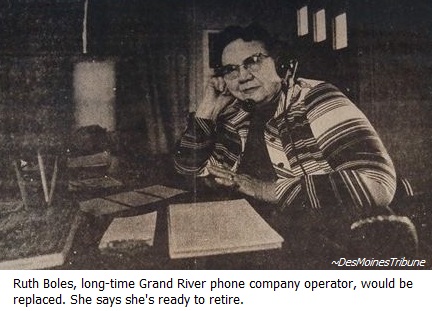 While
the vote was being taken Saturday, Ruth BOLES was thinking about the
future of the venerable switchboard at which she was working. While
the vote was being taken Saturday, Ruth BOLES was thinking about the
future of the venerable switchboard at which she was working."The Telephone Association of Iowa is going to make a museum in Des Moines," said BOLES, who, with her husband, managed the company here from 1943 until 1976, and whose parents ran the concern in 1918. "This is where I'd like to see this switchboard go," she said. A little later, there was a demonstration of the kind of service you can get only from the Grand River Telephone Co. and the non-dial company in Bryant Pond, Maine. “Anybody know who sells Golden Sun feeds at Leon?” BOLES asked of the board of directors, relaying a caller’s question. “Yes, it’s Morris MILLING,” board secretary Graydon GRIFFIN told BOLES, who passed the word on to the caller. |
| GRAND RIVER TO HANG UP ITS PHONES WITHOUT DIALS by "The Iowa Boy" Chuck Offenburger Before long, it's going to be much tougher spreading the word about garage sales, church suppers and early dismissals of school around the southern Iowa community of Grand River. News of births and deaths won't flash across the town as quickly as it does now. The local radio station is dying? Well, in a way, yes. The Grand River Telephone Co. – the last in the state (and one of only two in the nation) still using phones without dials – is going out of business. That means home-town operators will no longer be sitting before the switchboard in the small farm house that has served as the company's office. There'll be no one there to take and give messages, to ring around town when someone's away from home and has an important call, to listen to a late-night, long-winded and pointless story when someone's had a drink too many and is lonely. The conversion to the dial system is expected to take place in the next year or so. Grand River phone subscribers, who are paying about $6 a month for basic service now, authorized the switch in an election last February. The new service will be slicker, quicker, a little more expensive and a lot less personal. But isn't that the story on most all progress? "Over the phone, we've become like one big family here," operator Virginia THOMAS, 52, was saying recently as she was connecting and disconnecting callers. "There's a closeness that's developed that we're all bound to miss when we go dial." "Just a second," she said, adjusting her head set and swiveling in her chair back toward the suddenly alive switchboard. "Grand River. Who? Well, she's not a home right now, but she should be back before long. . . she just ran to town. . . yes, I’ll tell her." As the end draws near, THOMAS and the five other operators who take turns at the board find themselves frequently answering questions for strangers who drop in. They come for one last peek at yesteryear. |
| Leon Journal-Reporter Leon, Decatur County, Iowa December 4, 1980 and December 11, 1980 REFLECTIONS of DECATUR COUNTY Grand River Telephone Company by Lorine WARRICK Plans are being made to have the discontinuation of the present telephone exchange and the official beginning of the dial service of the Grand River Mutual Telephone Corporation, Saturday, Dec. 6, 1980. Records show that there have been 26 different directors since the first meeting of the North Central Grand River Telephone Exchange in 1903. (In the following spelling is often questioned.) Frank BRAMMER served the longest with 30 years of service, followed by George BRYANT with 29 years and Sherman BAKER with 22 years of service which ended in 1975. The first directors listed in 1906 were Ira YOUNG, who served that year, John HEWLETT served 3 years and John WELDON, 6 years. Other serving were: W. H. CAMPBELL, 5 years, 1907-1911; W. F. OVERHOLTZER, 3 years, 1909-1911; L. T. GREENLAND, 10 years, not in sequence, but starting in 1912; Dick BAKER, 2 years, 1912-1913; F. S. BONE, 3 years, 1912-1914; John McKEE, 2 years, 1915-1916; Ira BROWN, 3 years, 1015-1917; F. D. CONWELL, 1 year, 1918; Frank REDMAN, 3 years, 1918-1920; Doc BONE, 2 years, 1919-1920; W. B. DAY, 9 years, 1921-1930; Clyde CREES, 9 years, 1922-1931; Orval BURCHETT, 9 years, 1923-1032; Elec (sp?) HARGER, 3 years, 1928-1930; Lawrence FROST, 15 years, 1931-1946; Frank BRAMMER, 30 years, 1932-1962; George BRYANT, 29 years; 1934-1963; Geral HEWLETT, 9 years, 1945-1953; Sherman BAKER, 22 years, 1053-1975; Noel STARK, 19 years, 1962-1980; Max BINNING, 11 years, 1963-1974; Bernard CAMDEN, 5 years, 1975-1980; Robert TAYLOR, 4 years, 1975-1980. It seems the board had a non-voting president until 1023. No record of directors until 1906. The first chairman was John BRYANT. Other listed were Ira YOUNG, John WELDON, J. R. SCHMIDT, Jno. HEWLETT, W. H. YOUNG, A. R. SWITZER, Dick BAKER, W. B. REDMAN and W. B. DAY. Secretary Officers listed from 1904 on were: W. F. OVERHOLTZER, 1 year, 1904; W. M. SIPHERD, 11 years, 1905-1916; Ira BROWN, 6 years, 1917-1922; Elba SHEWMAKER held the longest record of any of the officers with 34 years, 1923-1957; Nile GIBSON, 1 year, 1958; Cliff HEWLETT, 9 years, 1959-1967; Don Morrell, 6 years, 1968-1973; Chris MORRELL, 5 years, 1974-1978. It seems the Secretary-Treasurer was combined as in 1975 Chris and it seems his wife [Donna MORRELL] acted as treasurer. Then a different setup of business was formed as a bookkeeper was hired. This ended up being Susie [Sue] BARTON. Graydon GRIFFIN has been secretary for 2 years, 1979-1980 and made out the final treasurer reports using Susie’s figures. The Treasurer officers were as follows: Dick TROWER, 1 year, 1904; J. C. BROTHERS, 3 years, 1905-1908; Farmers Bank (A. R. SWITZER & Arthur BLAIR), 22 years, 1909-1930; Orval BURCHETT, 23 years, 1931-1953; Nile GIBSON, 6 years, 1954-1959; Wayne PALMER, 11 years 1960-1971. Switchboard Operators throughout the years were as follows: Bird DAY, 10 years, 1904-1913; A. A. KELLY, 4 years, 1914-1918; Marion SPRAY, from August through December of 1918; W. A. DAY, 1 year, 1919; Frank HAWK, 4 years, 1920-1923; Jas. and Hazel HOPKINS, 3 years, 1924-1926 and again 8 years, 1931-1938; Fred CREES, 4 years, 1927-1930; Clarke (sic) BURCHETT, 3 years, 1938-1940; Clarence BRYANT, 2 years, 1941-1942; Willie BRYANT, 2 years, 1942-1943; Royal BOLES, 1944 on. The Royal BOLES family had operated the switchboard the longest, then Hazel and Jas. HOPKINS with 11 years. Many operators are still around that have helped in the switchboard and we have appreciated all of their service. . . . Sherman BAKER tells about his father, John BAKER, uncle Dick BAKER, and his grandfather, Peter STREET, having a three-party telephone exchange in circa 1900. It was between their three houses southeast of Grand River, without a switchboard. Shortly after that one switchboard was put in the Sam COVINGTON’S store in the building known as the "Big Brick." This survived and became the Company that was [still in operation in December] 1980. In the minutes of the North Central January 25, 1901, it states that it is the first meeting of the North Grand River Telephone Company. Officers elected were John BRYANT, chairman and president; W. F. OVERHOLTZER, secretary; and Dick TROWER, treasurer. They bought Sam COVINGTON'S switchboard for $100 and set a levy of $1.50 per year for switch fees. They decided to move the switchboard. In February, W. B. DAY was hired to operate the board for $12 per month and to receive messenger fees. The operators got up to $60 per month, and on up to last figure notices was $3,170 a year. In 1923, there were 280 phones and in 1941 the most with 320. . . . In June, 1964, a special meeting was held to set up a reorganization of the Company. February, 1971, the board met with Earl GRIM (sic, should be GRIMM) to discuss cost of dial. Jan. 7, 1978, the board agreed to set up a survey of patrons regarding dial. Dec. 14, 1978, at a meeting it was decided to have a representative from Princeton, Mo., present at the annual meeting to be held Jan. 6, 1979 at one o’clock at the Legion Hall and then a vote will be taken later. - Researchers, Noel STARK and Sherman BAKER |
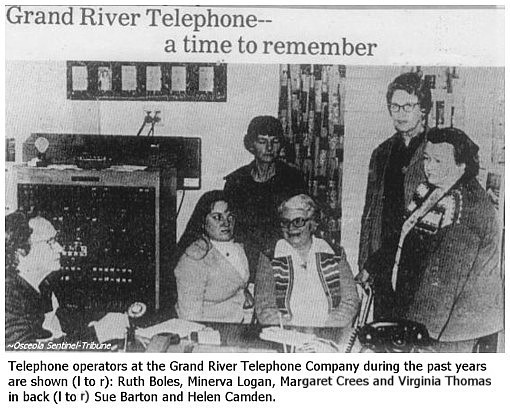 GRAND RIVER PHONE PATRONS HAVE CHANGEOVER |
| An end of an era occurred Saturday in Grand River when telephone
patrons gave up the personalized service they enjoyed with the old
fashioned hand-crank, people operated switchboard telephone service. Now
long distance phoning can be accomplished without the assistance of an
operator as direct distance dialing went into effect. The changeover took place Saturday, December 6, when Russell VANDER FLUGHT (sic), made the cable cut that changed Grand River Telephone Company from one of the two companies to use the old system. With the change, new phones have replaced the old crank type that have been used since telephones first came into existence at the turn of the century. 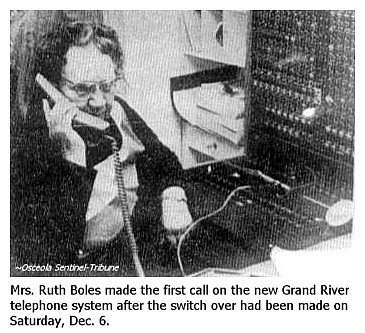 There
are 210 subscribers to the Grand River system which now becomes part of
the Grand River Mutual Corp. of Princeton, Missouri. The new system at
Grand River is the first to be installed by Grand River Mutual. And
customers will see their phone bills increase from $6.04 per month for
the old to $10.50 per month for the new service. There
are 210 subscribers to the Grand River system which now becomes part of
the Grand River Mutual Corp. of Princeton, Missouri. The new system at
Grand River is the first to be installed by Grand River Mutual. And
customers will see their phone bills increase from $6.04 per month for
the old to $10.50 per month for the new service.A redeeming feature of the changeover is the fact that customers may keep their old phones. The change has not been welcomed by all patrons, but some of the customers have asked that the ease of dialing long distance be made available to them. Along with the request of the Iowa Commerce Commission, the change to the modern system was made. Operators who worked until the changeover included Virginia THOMAS, Sue BARTON, Minerva LOGAN, Margaret CREES and Helen CAMDEN. They too, will see a difference in the changeover. Osceola Sentinel-Tribune, Osceola, Clarke County, Iowa, December 9, 1980 |
| The Leon Journal-Reporter Leon, Decatur County, Iowa December 11, 1980 END TO GRAND RIVER CO. ERA At 12:45 p.m. Saturday, Dec. 6, the last call from the hand-crank magneto Grand River Telephone Co., in Grand River, was made by operator Ruth BOLES before the system was cut over to the one-party dial service by the Grand River Mutual Telephone Corporation of Princeton, Mo., which operates several systems in the state of Iowa as well as Missouri. Mrs. BOLES, who has been an operator for the telephone company for 33 years, placed a call to Eldon HATHWAY (sic), manager, at Bryant Pond, Maine, one of the two remaining magneto systems in the United States. After completing the call Russell VANDERFLUGHT, manager of the Grand River Telephone Co., spoke to Mr. HATHWAY, concerning the switch over. During the conversation, HATHWAY was asked when he was going to turn over his system and he told them,"I will be waiting to see how you come out before I make the switch." Mr. VANDERFLGHT and Bob McARTON, manager of the Grand River Mutual Telephone Corp., carried on a conversation with HATWAY before the new dial system was put into operation. The small house in which the phone service was located was packed with fellow townspeople and the press to see the turnover. The Grand River Telephone Co., had 325 rural customers and will not be a part of the large systems operated by Grand River Mutual Telephone Corp. According to Bob McARTON, Russell VANDERFLUGHT, the former lineman and at the present time manager of the telephone company, did an excellent job of maintaining and operating the old system. "However, as we moved to update the system, the manual switchboard has been replaced with a new state-of-the-art digital switch. This will allow the rural residents of Grand River to enjoy the advantages of modern dial service many of us take for granted." In the past when patrons of the system in 150 square miles of the exchange area wanted to place a call, they cranked their telephone sets to signal the switchboard operator, Ruth BOLES, and she in turn would complete the call. Mr. McARTON said the installation of 80 miles of line and construction of the new telephone facilities was made possible by a $557,000 loan from the Rural Electrification Administration, and agency of the U. S. Agriculture Department. Concerning the switchover, Mrs. BOLES said she had been operator for 33 years. She started when her folks were hired to manage the phone company. The new system will be quicker and easier to call and more private than the old system. She said, "We must not stand still and let progress pass us by. I will miss the personal contact of the old system and will miss chatting with friend, giving the time of day and weather, alerting the police and fire departments in time of emergencies, however, I look forward to the new system and the conveniences that come with it." Following the switchover in the old system by Ron ECCLESTON, manager of the Leon District, in the new facility constructed to handle equipment, Russell VANDERLUGHT and Bob McARTON cut the cable at the outside of the phone house which severed the old system forever. |
| Des Moines Register Des Moines, Polk County, Iowa December 7, 1980 PHONE ERA ENDS in GRAND RIVER GRAND RIVER, IA. – Long distance phone operators and callers from around the country can breathe a sigh of relief. Grand River now has a spanking new one-party dial telephone system. With a flick of his wire-cutters, Russell VANDR FLUGHT (sic), general manager of the Grand River Telephone Co., severed the old main telephone cable and the small rural company's ties with the past. . . . It was only fitting that VANDER FLUGHT (sic), who has been the small system's lineman for 15 years and manager the past three years, should call the operator of the last remaining manual phone system in Bryant Pond, Maine. On Saturday afternoon, as the time for the historic cutover approached, subscribers crowded into the house that has served as "central" for the Grand River system. The old crank system was still in good shape. "It's the best manual system I’ve ever seen," said [Bob] McARTON [manager of the Grand River Mutual Telephone Corporation of Princeton, Mo.] But increasing pressure from some residents – and from the Iowa commerce Commission to upgrade to one-party service – and, finally, because of the uncertainty of financing it, apparently brought the change. And, there was always the trouble with long distance operators, usually in other states, who didn't believe there was such a place as Grand River because it was not on the familiar dial system. It seemed more and more as if those long distance operators didn't know the routing code to bring a call into Grand River. "Once last summer, I called Grand River from a pay phone in Arkansas," VANDER FLUGHT (sic) said with a laugh. "It took a half-hour to get the call put through. It wasn't until another operator gave the first operator the number to punch on the computer that we got the call through. Then they didn't know how much to charge me at the pay phone for the call. It was the end of the line" for the obsolete system, VANDER FLUGHT (sic) said. Finding new crank telephones and replacement parts to maintain the old magneto system was becoming a serious problem. Some of the older folks are a little slow with the new system and have been told by operators and relatives to hand up and try again. Roy HOPKINS, 71, remarked that sometimes a recorded voice interrupts his dialing and he does try again. Ruth BOLES, 77, who with her husband Royal, 78, managed the company for 34 years, until semi-retirement in 1977, hated to see it happen. "It's still a good system, and we can even call overseas on it," she said. But still, she agreed calls from elsewhere were becoming more and more of a problem. "In time, everything must improve. But I really don't think it will be improved in service," she said. She worked on the board as an operator for nearly 40 years, and knows something about service. And, while it's going to be nice to have a faster, dial system, many residents know they'll miss those little extras, the communication system that the old manual exchange gave them through the operator. "When we think we might get an important call, and we have to leave home for a while, we won't have the girls to give the number where we can be reached," said Evelyn BOOTH. "And there won't be any more line calls to tell everyone about the church suppers and the other announcements." Line calls were done with a long ring punched by the operator, alerting all residents of an announcement of general interest. All could pick up their phone, and get the word at the same time. Emergencies could be signaled the same way. "When my husband had a tractor accident 12 years ago, I just called the operator," said Katherine GRIFFIN. "The operator called the doctor, my daughter, the ambulance and my neighbor to come over and do the chores. We've lost that kind of service now. I never could have made all those calls myself in an emergency like that." . . . McARTON said people in this area, like those in other rural areas before them, have come to the time when they realize the telephone is "no longer a luxury – it's a necessity" – and that phone efficiency and speed of calls are essential. . . .The cutover Saturday also marked the transfer of ownership and management to the Grand River Mutual Telephone Corp. After Ruth BOLES placed the new system's first direct dial call to her grandsons, Gregory and Marlin BENSON in Gowrie, everyone retired for coffee and doughnuts at the Lions Hall here. It was a day to rejoice, and a day to be a little sad. "I'll miss it all," said Ruth. "Anything you've done this long becomes a part of you." The Burlington Hawk Eye also published an article about Grand River's telephone system. An excerpt follows: Out-of-town callers often had to deal with confused long-distance operators to complete their calls. Directory information, for example, lists the Grand River switchboard number as only "0006." "The biggest reason for the change was the people away from here having trouble getting their calls in here," said Ruth BOWLES (sic), 77, who with her husband, Royal, 78, managed the phone system for 39 years until Royal retired in 1977. Mrs. BOWLES (sic) will place the last call on the crank system at 1 p.m. Saturday when the Mutual Telephone Corp. of Princeton, Missouri, takes over. The system cost around $800,000 to install; residents saw their monthly rate go from $6.04 to $10.50 for a basic dial phone or $12 for a push-button phone. Operators from the old switch-board system gathered for a final time the night before the change, in "a smoke-filled frame house down the street from the new automated switching center." "When it was first in the news that we were going out, we had calls from everywhere," said Sue BARTON, operator and bookkeeper for the company. Ms. BARTON said she and the other operators, Margaret CREES, Minerva LOGAN, Helen CAMDEN and Virginia THOMAS, are resigned to their pending layoffs. Russell VANDERFLUGHT, a lineman for 17 years and manager for the last three years, said the old crank phones and other equipment from the system will probably be auctioned [Spring of 1981], with proceeds divided among company employees. The operators ran the switchboard 24 hours a day, seven days a week. NOTE: Bryant Pond, Maine, was the last community in the United States to go to dial phones on October 11, 1983. SOURCE: newspaper clippings and scrapbook collections of Norma G. (FOLAND) BECKER Transcriptions by Sharon R. Becker May 10, 2008; updated July 31, 2013 |
| History Index *** Decatur County IAGenWeb |